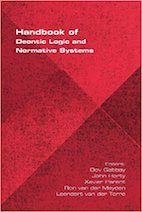
Handbook of Deontic Logic and Normative Systems
Volumes 1 and 2
Editors: Dov Gabbay, John Horty, Xavier Parent, Ron van der Meyden and Leon van der Torre
Volume 1 out!
Link to digital version on the publisher's web site
Volume 2 out!
Link to publisher's web site
Scientific Introduction
0 ) SURVEY. Like all handbooks, the articles will give a survey of the area (2/3) and may also contain a more personal view (1/3). For the survey part, at least the work reported in the DEON conference series should be discussed, all abstracts can be searched on this website
1 ) FORWARD LOOKING. Instead of a historical overview only, we will make a forward looking volume, focussing on new developments. History is restricted to two chapters.
2 ) PROBLEM DRIVEN. We distinguish logical problems (permission, counts-as, ctd, dilemmas, etc) from formalisms (SDL, DSDL, input/output logic, etc) and applications (electronic commerce, security, specification and verifiction, norm compliance, normative multiagent systems, etc). In other words, we do not just collect logical systems and subsequent 'problems', but we start from what you can do with deontic logic and formal systems of normative reasoning.
3 ) NO APPLICATIONS IN VOLUME 1. The first volume is on foundations. The second foreseen volume is on appplications and will build on the first one. In general, we do not emphasize the many major areas where deontic ideas play: philosophy, law, computer science, economics, etc. - and then present the logic as an answer to a Genuine Problem: finding the common patterns, allowing for 'trade in ideas'. The applications starting point is not feasible, because applications are not well developed yet (this is the reason why we put them a second volume). Note: this is analogous to the situation for the quantum logic handbook, where they did a second volume on applications.
4 ) NUMBER OF VOLUMES IS OPEN. For example, there may be a third volume on applications in law.
5 ) BROAD. In the first volume, we appeal to all disciplines, including logic, computer science, law, philosophy, linguistics
6 ) COMPREHENSIVE. It can be as long as it takes, both for chapters as for whole volume. Though there are no page limits, we estimate articles of 50 pages. For each volume, there is a maximum of 820 pages for publishing reasons.
7 ) CHEAP. It is published by College Publications (authors keep their copyright), which sell books at a cheap price (approx. 20 euros). Main reason is that the book should be affordable for student courses.
Table of Contents - volume 1
Preface
Part 1 - BACKGROUND
- Deontic logic: a historical survey and introduction (R. Hilpinen and P. McNamara)
- Imperatives logic and its problems (J. Hansen)
Part 2 - CONCEPTS AND PROBLEMS
- The varieties of permissions (S.O. Hansson)
- Prima facie norms, normative conflicts and dilemmas (L. Goble)
- The theory of normative positions (M. Sergot)
- Constitutive norms and counts as conditionals (D. Grossi and A. Jones)
Part 3 - NEW FRAMEWORKS
- Alternative semantics for deontic logic (S.O. Hansson)
- Input/output logic (X. Parent and L. van der Torre)
- The theory of joining systems (L. Lindahl and J. Odelstad)
Table of Contents - volume 2
Preface
PART 1 - FURTHER BACKGROUND
- Preference Semantics for Hansson-type Dyadic Deontic Logic: a Survey of Results (X. Parent)
- Recent Thought on Is and Ought: Connections, Confluences and Rediscoveries (L. Humberstone)
PART 2 - MORE CONCEPTS AND PROBLEMS
- Logics for Supererogation and Allied Normative Concepts (P. MacNamara)
- Deontic logic and preference changes (J. van Benthem and F. Liu)
PART 3 - MORE NEW FRAMEWORKS
- Adaptive Deontic Logics (F. Van De Putte, M. Beirlaen, and J. Meheus)
PART 4 - EXTERNAL RELATIONS
- Practical Reasoning: Problems and Prospects (R. Thomasson)
- Logic and the Law: Philosophical Foundations, Deontics, and Defeasible Reasoning (G. Sartor, G. Governatori, and A. Rotolo)
- Deontic Logic and Ethics (S. Nair)
- Deontic Logic and Game theory (O. Roy)